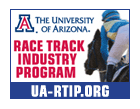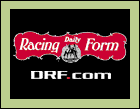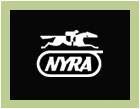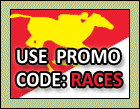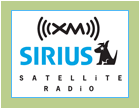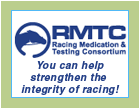JOHN IS GONE
2007-10-10
It's Post Time By Jon White
Courtesy of www.Xpressbet.com/HRTV.com
JOHN IS GONE..
As you probably know, legendary John Henry was euthanized Monday evening at the Kentucky Horse Park. He was 32.
"The mighty heart of the great John Henry has, at long last, yielded to time," John Nicholson, executive director of the Kentucky Horse Park, said in a press release posted at the park's website. "The racing industry has lost a legend, but more significantly, many people have lost a personal hero. John Henry's true legacy was written in people's hearts far more indelibly than his superlative racing career could ever reflect.
"John Henry was a testament to the fact that a horse?s value is far greater than the sum of his pedigree, conformation, sales price and race record. Winston Churchill said that the outside of a horse is good for the inside of a man, but I would add that horses like John Henry prove that the inside of a horse is even better for the inside of man."
According to the press release, "The sad but unanimous decision [to euthanized John Henry] was reached by a team of people who knew him best. The park's equine director, Kathy Hopkins, stated, "After continued successful efforts to maintain the quality of John Henry's life, in the past 48 hours he did not respond to our medical intervention. Due to the loss of kidney function and muscle mass, his veterinarian, Dr. Mike Beyer, found it impossible to keep him properly hydrated and comfortable. Over the years, our goal has always been to maintain the highest quality of care and life for him, and it became evident over the weekend that this was no longer possible. Our hearts go out to all of those who so deeply cared for John during his long and charismatic life."
The press release also stated that John Henry "went peacefully to sleep surrounded by a small circle of friends who were closest to him, including Cathy Roby, who has been his friend and caretaker for 16 years, and his breeder, Verna Lehmann. John Henry overcame numerous and well-known obstacles throughout his career [including] colic surgery in 2002. His talent, determination, tenacity and toughness inspired thousands of people who didn't even see him race, but became aware of him many years after his retirement. Some of his fans visited him at least once a month from Toledo, Indianapolis and other cities in the Midwest, while others made annual pilgrimages to his barn from California, Texas and around the world. When it recently became public knowledge that his health was in a state of decline, many of his fans immediately came to the park to thank their beloved champion for the memories, and to whisper their personal, final farewells to the horse who inspired great respect and ardent devotion."
A recent letter to the editor in the Daily Racing Form from Joseph Muzio of Levittown, N.Y., serves as an example of that respect and devotion.
"Good ol' John Henry, by Bob Bowers. I first saw you all those years ago in October of 1981 at Belmont Park," Muzio wrote. "You were 6 years old at the time, and I was 12 years your senior, but you were already the old pro. You won the Jockey Club Gold Cup at 1 1/2 miles and they claimed foul against you and Willie Shoemaker, but of course they declared you the winner. Just like weeks before you willed yourself to be the first winner of the Arlington Million after they all announced you as the loser.
"There have been changes to our game -- sheets, slots and simulcasts -- but nothing compares with coming out to the races to see the likes of you, John Henry. Somehow, over 30 years ago, you were aptly named for a folk hero -- John Henry, an American legend."
Also typical, I'm sure, of the sadness felt by thousands of racing fans is the e-mail I received from California owner, breeder and racing fan Pat Lawyer, which said: "My heart is broken and the tears are plenty. I know I am not alone."
A public memorial service to remember and celebrate the remarkable life and legacy of John Henry will be held at the Kentucky Horse Park on Oct. 19.
John Henry's life had an "early history that taxes credulity," Daily Racing Form's Joe Hirsch once wrote. Bred by in Kentucky by Golden Chance Farm, John Henry was sold at the Keeneland fall yearling sale of 1976 for $1,100 to J.E. Colloway. Then, at the January sale of 2-year-olds at Keeneland, Hal Snowden purchased John Henry for $2,200.
"Even at that modest price, John Henry was no prize," Hirsch wrote in the 1982 American Racing Manual. "Snowden recalls he was back at the knees, ungainly in appearance, and fiery of disposition. After he destroyed several hundred dollars worth of young Snowden's feed tubs and water buckets, Snowden had him gelded."
Snowden later sold John Henry for $10,000 to Colleen Madere. Under Madere's silks, John Henry won his career debut by a nose in a four-furlong race at Jefferson Downs in Louisiana on May 20, 1977. Six starts later, John Henry won his first stakes race, the 1977 Lafayette Futurity at Evangeline Downs on a sloppy track. He prevailed by a head in that six-furlong affair.
At the Fair Grounds early in 1978, John Henry finished sixth for a $25,000 claiming price on Feb. 15, 10th for $20,000 on Feb. 22 and third for $25,000 on March 22. A frustrated Madere called Snowden and asked if he would be willing to trade her a couple of untried 2-year-olds for John Henry. Snowden agreed and John Henry was again his.
John Henry finished fourth for Snowden in an allowance race at Keeneland on April 11. Sam Rubin, an importer of bicycles from the Far East, then bought John Henry for $25,000. From that day on, John Henry raced under the brown and blue silks of Rubin and his wife, Dorothy (Dotsam Stable).
For the Rubins, John Henry won 16 Grade I races and was voted seven Eclipse Awards, two for Horse of the Year (1981 and 1984), four as champion turf male (1980, 1981, 1983, 1984) and one as champion older male (1981). John Henry was inducted into the Hall of Fame in 1990.
I recently wrote that I considered John Henry a friend. I felt that way about him because, from 1981 to the end of his racing career, I would see him about 300 days out of the year. During those years, he was a very important part of my beat as a reporter and columnist in Southern California for the Racing Form.
In fact, I was there, on that morning in 1985, when John Henry left Del Mar for his new home, the Kentucky Horse Park, where he would join the retired Forego, another of the sport's greatest geldings.
"Well, this is your final trip, grandpappy," Lewis Cenicola said in a soft voice shortly after 6 o'clock that morning as he led John Henry out of his stall at Ron McAnally's barn.
Cenicola, the gelding's longtime exercise rider, led John Henry up a ramp into a large van parked next to the barn. As the van drove off into the rising morning sun, I asked trainer Ron McAnally how he was holding up. While under McAnally's care, John Henry won 26 of 39 starts.
"Not too bad right now," McAnally replied. "But it'll probably really hit me when I come back from Kentucky. That'll be tough."
Prior to his departure from Del Mar that morning, John Henry, as cantankerous as ever, attempted to chomp off bits of McAnally and veterinarian Rick Arthur. I remember thinking at the time that we will all be lucky if we have such spunk when the day comes to retire.
One of John Henry's many fans had sent him a retirement gift. McAnally told me that someone had been kind enough to make sure that John Henry began his retirement in Kentucky with a rather large supply of sugar.
In most cases, when a horse retires, the trainer is asked to name the horse's best race. Because John Henry had so many, I asked McAnally that morning at Del Mar if he could boil it down to five.
"Oh, gosh, even that's hard," McAnally said. "There were so many that were so good."
But McAnally did come up with what he considered to be John Henry's five greatest races, in no particular order. So I will use that as the basis for coming up with my own list of John Henry's Top 10 races. I'll put McAnally's choices at No. 1 through No. 5.
JOHN HENRY'S TOP 10 RACES:
(10) TURF CLASSIC AT BELMONT PARK IN 1984. This was a prime example of John Henry's incredible gameness. He went right to the front in the 1 1/2-mile event and simply refused to ever let any of his rivals get by.
In the Turf Classic, John Henry caused Win to lose, holding off that opponent throughout the entire final furlong. In an exceptional performance, especially for a 9-year-old, John Henry prevailed by a neck with Chris McCarron aboard. Finishing fourth was All Along, America's 1983 Horse of the Year and winner of the 1983 Prix de l?Arc de Triomphe.
The 1984 Turf Classic was one of Cenicola's favorite John Henry races.
"He was in front all the way that day and set a stakes record," Cenicola once told me. "You don't see them go wire to wire and set a stakes record on the turf very often in New York."
(9) HOLLYWOOD TURF CUP IN 1983 AT HOLLYWOOD PARK. If not for this victory, John Henry would have won six Eclipse Awards, not seven. Had he not won the 1983 Hollywood Turf Cup, he quite likely would not have been voted the Eclipse Award that year as champion male turf performer. He made only five starts in 1983. His only other victory that year came in the American Handicap at Hollywood Park.
When John Henry took the 1983 Hollywood Turf Cup with McCarron in the irons, there was a measure of sweet revenge. After winning the Oak Tree Invitational for three consecutive years, he finished second to Zalataia, a filly from France, in the 1983 renewal. Then, in the Hollywood Turf Cup the following month, John Henry turned the tables on Zalataia, who finished second.
(8) JOCKEY CLUB GOLD CUP IN 1981 AT BELMONT PARK. In those years, the 1 1/2-mile Jockey Club Gold Cup essentially was what the Breeders' Cup Classic is today, the nation's most important dirt race late in the year. With Bill Shoemaker in the saddle, John Henry had a 1 1/2-length advantage with a furlong to go and prevailed by a head over 50-1 longshot Peat Moss.
This was another revenge victory. Temperence Hill had won the 1980 Jockey Club Gold Cup by 5 1/2 lengths, with John Henry second. Temperence Hill finished sixth behind John Henry in the 1981 Gold Cup.
(7) AMERICAN HANDICAP IN 1983 AT HOLLYWOOD PARK. This was John Henry's 1983 debut. He had not started since finishing 13th in the Japan Cup late in 1982, a trip in which he became so ill that he nearly died.
Going into the 1983 American Handicap, many had written off John Henry as being over the hill. Silencing the skeptics, as he did so many times, John Henry came from just off the pace under McCarron to win the American Handicap by 1 1/4 lengths. As John Henry returned to the winner's circle, the fans went absolutely wild, giving him one of the loudest and longest ovations ever seen at a California track.
(6) OAK TREE INVITATIONAL IN 1981 AT OAK TREE AT SANTA ANITA. This was one of the most incredible performances I have ever seen live. Among those taking on John Henry was Spence Bay, who was coming off a win in the Carleton F. Burke Handicap while soundly defeating Providential II. Providential II would go on to take the Washington, D.C., International. In those years, the International was pretty much what the Breeders' Cup Turf is today.
When Spence Bay and jockey Fernando Toro roared by John Henry and Shoemaker to get the lead with a furlong to go in the Oak Tree Invitational, it looked like John Henry was beaten for sure. Inside the furlong marker, Spence Bay led by about a half-length and had so much momentum that it appeared he was going to win by daylight. But after relinquishing the advantage, John Henry, in yet another demonstration of his tremendous will to win, fought back to regain the lead in the closing yards.
"I thought I was a cinch at the eighth pole," Toro once told me. "I couldn't believe that John Henry came back on to win that race."
John Henry prevailed by a neck.
"The crowd gave him a thunderous ovation that lasted for a full five minutes," Hirsch wrote.
(5) SAN JUAN CAPISTRANO HANDICAP IN 1980 AT SANTA ANITA. This is the first of the five races selected by McAnally. With Darrel McHargue aboard for the marathon trip at about 1 3/4 miles on the turf, John Henry won by 1 1/4 lengths while carrying 126 pounds.
"I pick that race because of the weight he carried," McAnally said. "He was in front all the way. They kept coming at him, but he kept putting them away."
(4) BALLANTINE'S SCOTCH CLASSIC HANDICAP IN 1984 AT THE MEADOWLANDS. This turned out to be John Henry's 83rd and final start and 39th victory. Ridden by McCarron, John Henry won going away by 2 3/4 lengths as the icing on the cake for his 1984 Horse of the Year campaign at the age of 9. As I've written and stated many times, I seriously doubt we will ever see another 9-year-old Horse of the Year.
"I had told Chris [McCarron] that it didn't look like there was much pace in the race and that he probably wouldn?t be far off the early lead," McAnally said. "Yet, John was way back early. But he still came on and won it somehow. And he was hurting, too. It was after that race that he developed a swelling in the splint bone area [in his left foreleg]."
This was one of Sam Rubin's favorite John Henry performances.
"He was absolutely unbelievable that night," Rubin once told me. "He was about 15 lengths out of it, then suddenly, before you knew it, he won by about two and a half."
(3) ARLINGTON MILLION IN 1984 AT ARLINGTON PARK. This was, without question, one of the greatest performances by a 9-year-old. John Henry won with authority by nearly two lengths.
"In that one, he beat a filly who would go on to be named the grass filly of the year," McAnally noted.
Indeed, the runner-up in the 1984 Arlington Million was the outstanding filly Royal Heroine, who later that year took the inaugural Breeders' Cup Mile at Hollywood Park.
(2) SANTA ANITA HANDICAP IN 1982 AT SANTA ANITA. This was the 45th running of the Big 'Cap. John Henry became the first horse to win it twice. Not only that, he came into the March 7 event having not competed since Dec. 6.
"I say that race was one of his best because he came up to it on works and beat a top horse in Perrault," McAnally said.
Perrault, ridden by Laffit Pincay Jr., actually finished first in the 1982 Santa Anita Handicap, a scant nose in front of John Henry and Shoemaker. Perrault, carrying 126 pounds, drifted out considerably in the final furlong. John Henry, shouldering 130 pounds, raced to the outside of Perrault down the stretch. "Following a stewards' inquiry into the stretch run," Daily Racing Form?s official chart states, "Perrault was disqualified and placed second for impeding John Henry."
(1) ARLINGTON MILLION IN 1981 AT ARLINGTON PARK. This was the first $1 million Thoroughbred race in history. And it's probably John Henry's greatest victory.
"He won despite the unfavorable conditions," McAnally said. "The surface was so soft and John adjusted to it to come from way back and win by a nose."
John Henry defeated such accomplished runners as Madam Gay, second to Shergar in Ascot's King George VI and Queen Elizabeth Stakes; Key to Content, winner of the United Nations Handicap at Atlantic City; and Argument, who had been victorious in the 1980 Washington, D.C., International.
But it was a fellow California-based horse, a 40-1 longshot by the name of The Bart, who finished second and came oh-so-close to beating John Henry and Shoemaker that day.
"The bottom line is that John Henry won when his cause appeared completely lost," Joe Hirsch wrote of the 1981 Arlington Million.
Come to think of it, one could say the same thing to describe John Henry's entire life.



